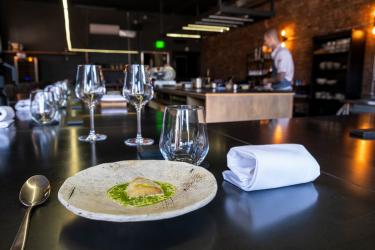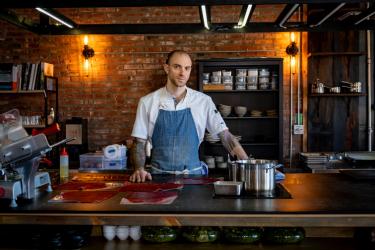At chef Logan Ely’s table, a simple prawn or apple may have a complex journey his delighted diners could not imagine. Savage, which opened in the Fox Park neighborhood last September, is already known for innovative treatment of its ingredients, served in a series of small courses. Depending on appetite, one might order up five little revelations with the snack plate ($25), or a six-course ($55) or 12-course ($75) tasting menu.
Chef Logan’s experimentation is driven by the staff limitations of any small business and by Logan’s faithfulness to environmentally friendly sourcing and cooking. He shops what’s available in-the-now and then gets creative, much like his ancestors had to do.
“Savage was a word that jumped out because of the definition: a group or individual that’s regarded as primitive or uncivilized,” says Logan. “For example, we ferment our own cheese, which is something people have been doing for thousands of years — and that’s pretty primitive.”
A bounty of seasonal produce may undergo several cooking methods, fermentation, preservation or a combination. In one recent apple experiment, Logan cooked whole apples for weeks at various temperatures — incubated them for lack of a better term — to preserve the fruit. “Luckily, it turned out delicious and we put it on the menu.”
Logan’s techniques may at times be primitive but are anything but uncivilized. A native St. Louisan, he has worked in kitchens as far-flung as Tokyo, New York, Napa, Copenhagen and beyond. While he’s absorbed immeasurable wisdom from diverse masters of the cooking craft, it’s the common reverence for their natural resources that has most greatly affected his own approach.
“We don’t write a menu and then go find the ingredients,” he says. “We go find ingredients and then write a menu. I’ll order a bunch of what [the farmer] has and figure out what to do with it. We don’t go and daydream this idea and then force things into it.”
To further minimize the impact his business has on Mother Earth, Logan leans more heavily on seafood proteins than land animals, which he says place a greater strain on the environment. He works with fishers who are conscientious about sustainability and habitat preservation.
“There’s not much you can do about transport, being in the Midwest, but we can buy from fishermen who use dayboats and FedEx the catch to us the next day. I can specify that I want to purchase only seafood that is fished or harvested a certain way.”
While seafood and nonseasonal items may remain constant, other dishes may change weekly or monthly — and rest assured, every day will be different than the day before. Diners choose how many courses they want and inform the staff of any food aversions or allergies they have, and then enjoy each surprise as it unfolds. It’s the nature of staying nimble in a changing world.
Savage is open for dinner beginning at 5 p.m., Thursday-Sunday. The restaurant opens at 2 p.m. with a drink and small snack plate menus.











